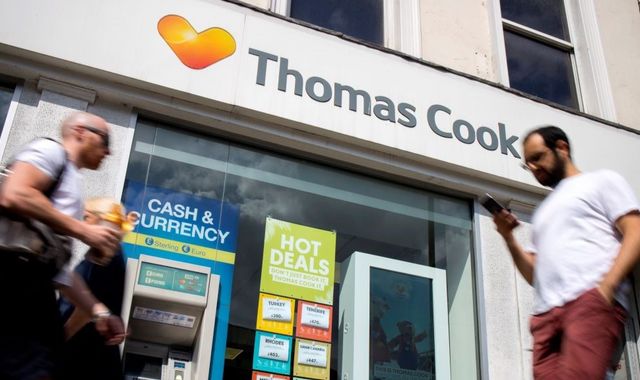Thomas Cook begs lenders to slash £200m demand
Written by News on 22/09/2019
Thomas Cook Group has issued a last-gasp plea to its lenders to reduce a £200m funding demand with Britain’s oldest travel agent just hours away from possible insolvency.


Sky News has learnt that the company has asked its syndicate of lenders to substantially cut the standby funding they require – or amend its structure – to see Thomas Cook through the winter period.
The lenders were considering the proposal on Sunday afternoon as part of an eleventh-hour rescue package that would prevent the company from collapsing into administration in the early hours of Monday morning.
Alongside the request to the lenders, credit card companies have been asked to release £50m of cash they are holding as collateral against Thomas Cook bookings, according to a source close to the travel agent.
Fosun Tourism Group, which has committed £450m to the rescue of Thomas Cook, is unlikely to increase its contribution although bondholders are thought to have been asked to contribute an additional sum to plug the remaining funding gap, according to insiders.
Discussions about the possible rescue were continuing on Sunday afternoon at the office of Latham & Watkins – with the meeting venue switched at the last minute after Sky News revealed the original location on Saturday night.
Sources said the fact that talks were ongoing was positive but said Thomas Cook‘s fate was still hanging in the balance.
Unless they are confident that a deal can be struck to salvage the company’s future later in the evening, board members will appoint administrators from AlixPartners.
If it does collapse, Britain’s biggest-ever peacetime repatriation operation would be triggered, requiring approximately 165,000 holidaymakers to be flown back to the UK.
The Civil Aviation Authority is leading the exercise, which has been code-named Project Matterhorn.
In recent days, the London-listed company has explored a multitude of options to raise the remaining £200m demanded by its banking syndicate two weeks ago.
That £200m request took the overall size of a rescue package from £900m to £1.1bn, with the original sum comprising £450m from Fosun and the other half from lenders and bondholders.
Many of those have been discounted because there is insufficient time to implement them before Thomas Cook runs out of money.
A plan for Triton Partners to buy Thomas Cook’s Nordic operations was still under discussion earlier in the weekend, as was a proposal to keep its airlines in the UK, Germany and northern Europe out of administration while letting its British tour operating arm fail.
However, one insider suggested that neither was likely to be viable.
A separate discussion between the company and CQS Management, the hedge fund, to provide a chunk of the additional funding was also aborted in the last fortnight.
One source suggested that the company had not entirely discounted the possibility of the government providing some short-term funding on commercial terms, despite comments by Dominic Raab, the foreign secretary, who appeared to cast doubt on the idea.
Union bosses urged ministers to nationalise Thomas Cook on Sunday, arguing that the cost of doing so would be trivial in the context of the bank bailouts of 2008.
Weak trading, which company executives have partly blamed on Brexit-related uncertainty, has forced them to increase Thomas Cook’s financing requirements several times in recent months.
Sky News revealed on Thursday that Thomas Cook, which was founded in 1841, was expected to crash into administration as soon as Sunday night unless the £200m funding gap could be filled.
More than 20,000 jobs across the group are at risk if it collapses, with 9,000 of those jobs in the UK.
Several hundred thousand people from other European countries are also current customers of Thomas Cook at scores of vacation destinations.
Thomas Cook had already warned that it could face collapse unless it finalises a rescue deal this month, saying in a court filing last week that it “would be likely to run out of money and enter into formal insolvency proceedings” if it did not.
Some 11 million customers will have travelled with Thomas Cook by the end of the crucial summer season.
Efforts to secure its rescue have, though, been hampered by weak trading and the competing demands of financial stakeholders including its pension trustees and the holders of insurance against default on its debts.
Thomas Cook has been targeting the injection of new money from the recapitalisation by early October in order to pay hoteliers and other key suppliers.
In order to survive, it would also need to persuade the CAA, which administers the ATOL scheme covering travel companies, that it should renew its licence at the end of September for another 12 months.
Current trading at Thomas Cook is understood to have remained difficult for months, with the ongoing political crisis in Westminster contributing to soft consumer demand for autumn and winter bookings.
On Friday shares in Thomas Cook closed at 3.45p, more than 95% lower than at the same point last year.
The British company was founded in 1841 by a 32-year-old cabinet-maker and former Baptist preacher who began offering one-day rail excursions from Leicester to Loughborough for a shilling.
From there, it went on to become one of the world’s largest holiday companies, marking its 175th anniversary three years ago.
Thomas Cook, its lenders and Fosun declined to comment on Sunday afternoon.
(c) Sky News 2019: Thomas Cook begs lenders to slash £200m demand






